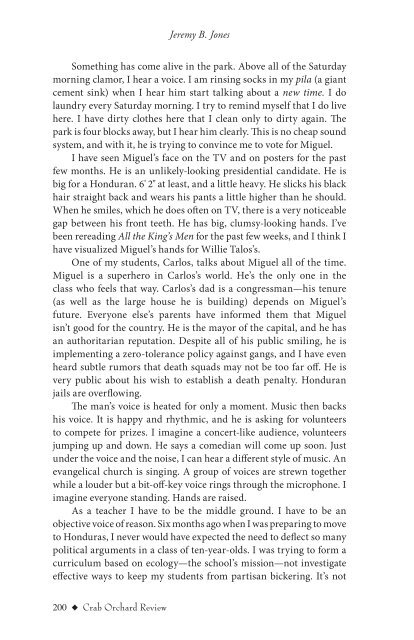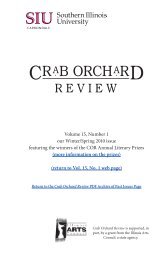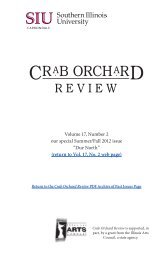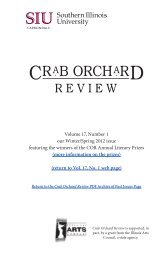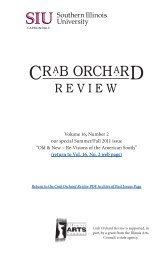Crab Orchard Review Vol. 12, No. 2, our
Crab Orchard Review Vol. 12, No. 2, our
Crab Orchard Review Vol. 12, No. 2, our
You also want an ePaper? Increase the reach of your titles
YUMPU automatically turns print PDFs into web optimized ePapers that Google loves.
200 ◆ <strong>Crab</strong> <strong>Orchard</strong> <strong>Review</strong><br />
Jeremy B. Jones<br />
Something has come alive in the park. Above all of the Saturday<br />
morning clamor, I hear a voice. I am rinsing socks in my pila (a giant<br />
cement sink) when I hear him start talking about a new time. I do<br />
laundry every Saturday morning. I try to remind myself that I do live<br />
here. I have dirty clothes here that I clean only to dirty again. The<br />
park is f<strong>our</strong> blocks away, but I hear him clearly. This is no cheap sound<br />
system, and with it, he is trying to convince me to vote for Miguel.<br />
I have seen Miguel’s face on the TV and on posters for the past<br />
few months. He is an unlikely-looking presidential candidate. He is<br />
big for a Honduran. 6' 2" at least, and a little heavy. He slicks his black<br />
hair straight back and wears his pants a little higher than he should.<br />
When he smiles, which he does often on TV, there is a very noticeable<br />
gap between his front teeth. He has big, clumsy-looking hands. I’ve<br />
been rereading All the King’s Men for the past few weeks, and I think I<br />
have visualized Miguel’s hands for Willie Talos’s.<br />
One of my students, Carlos, talks about Miguel all of the time.<br />
Miguel is a superhero in Carlos’s world. He’s the only one in the<br />
class who feels that way. Carlos’s dad is a congressman—his tenure<br />
(as well as the large house he is building) depends on Miguel’s<br />
future. Everyone else’s parents have informed them that Miguel<br />
isn’t good for the country. He is the mayor of the capital, and he has<br />
an authoritarian reputation. Despite all of his public smiling, he is<br />
implementing a zero-tolerance policy against gangs, and I have even<br />
heard subtle rumors that death squads may not be too far off. He is<br />
very public about his wish to establish a death penalty. Honduran<br />
jails are overflowing.<br />
The man’s voice is heated for only a moment. Music then backs<br />
his voice. It is happy and rhythmic, and he is asking for volunteers<br />
to compete for prizes. I imagine a concert-like audience, volunteers<br />
jumping up and down. He says a comedian will come up soon. Just<br />
under the voice and the noise, I can hear a different style of music. An<br />
evangelical church is singing. A group of voices are strewn together<br />
while a louder but a bit-off-key voice rings through the microphone. I<br />
imagine everyone standing. Hands are raised.<br />
As a teacher I have to be the middle ground. I have to be an<br />
objective voice of reason. Six months ago when I was preparing to move<br />
to Honduras, I never would have expected the need to deflect so many<br />
political arguments in a class of ten-year-olds. I was trying to form a<br />
curriculum based on ecology—the school’s mission—not investigate<br />
effective ways to keep my students from partisan bickering. It’s not


